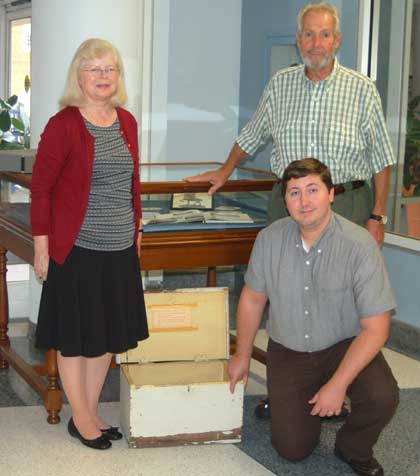Lee letters found in Longwood’s archives
Published 10:41 am Thursday, September 3, 2015

- MARGE SWAYNE | HERALD Longwood archivist Lydia Williams, left, Gavin Hosman, kneeling, and Dr. James Jordan, discuss the recent find of two Robert E. Lee letters in the Greenwood Library archives. Another Longwood artifact, the dispatch box, front, of Civil War Gen. Joseph E. Thornton, offers clues to the letters’ authenticity.
Seven months on the job at Longwood’s Greenwood Library, Gavin Hosman made the discovery of an archivist’s lifetime. At the bottom of “an ordinary stationary box,” Hosman found an envelope labeled “Letters of Robert E. Lee.”
Hosman immediately went to the office of Longwood’s archives specialist Lydia Williams.
“I went to Lydia and asked, ‘Do you know if we have Lee letters in our collection?’” Hosman said.
No one at the university knew it at the time, but the answer was “yes.”
Hosman, a graduate of George Mason University who recently completed his master’s in library information studies, accepted the position at the Greenwood Library in January and began helping Williams with archives.
“When I saw the writing on the envelope, I thought it
couldn’t have been true,” Hosman said. “The envelope was buried in the bottom of the box. It looked like just an ordinary pile of things from someone’s house.”
Inside the envelope were two letters signed “R.E. Lee” dated April 26, 1845, and Nov. 10, 1868. They were in a box of papers from the Johnston Family, a prominent Farmville family during the 1800s.
Why the Lee letters were included in the Johnston Family Collection remains a mystery.
Longwood professor of anthropology Dr. James Jordan believes the letters may be linked to a Longwood artifact he acquired some years ago.
“Thirty-six years ago, some carpenters were in the attic of the Longwood Alumni House on High Street repairing a leak,” Jordan said. “They found an old box and brought it to my office.”
Inside was a card that read: “This is the chest in which General Joseph E. Johnston carried his military papers.”
“The dispatch box would have been used for carrying papers and maps,” Jordan said. “It would have been strapped to a wagon with a stool and little table. When they stopped, Gen. Johnston could set up his office.”
Johnston and Lee were friends, Jordan noted.
“Johnston was a lieutenant general when the Civil War began but was wounded in 1862,” he said.
Later in the war, Gen. Johnston returned to active duty and was in charge of troops in North Carolina when Lee came through Farmville in April 1865.
“That’s where Lee was trying to go when he came through Farmville,” Jordan said. “He was trying to join up with Johnston’s forces in North Carolina.”
While the recently discovered letters were not from the Civil War years, their content and Lee’s friendship with Johnston provide numerous connections to Farmville and Longwood in particular.
“Joseph E. Johnston was born at the Longwood House in 1807,” Jordan said. “The family who built Longwood House in 1727 were Johnstones from Scotland who named their place ‘Loch Wood,’ or Lake in the Wood. That was later changed to Longwood, which became the name of the college in Farmville.”
Jordan speculated that Johnston’s dispatch box had been stored in the family’s home, later known as Longwood House. At some point, Jordan surmised, the historic home was cleared out, and in all likelihood the box was moved to the Alumni House, another Longwood property. There, like the Lee letters, the box remained undisturbed for a many years.
“I’m a big supporter of holding on to history and print materials, especially letters,” Longwood archivist Lydia Williams said. “We don’t want to get rid of anything that will give people a chance to see what has taken place in the past.”
The recently discovered letters offer a glimpse of Lee’s day-to-day life before and after the Civil War.
The letter dated April 26, 1845, bears dark orange wax seals on both margins and is addressed to Capt. Henry Brewerton of the Army Corp of Engineers. Brewerton went on to become supervisor of West Point, a post he held until replaced by Lee in 1852.
The Nov. 19, 1868, letter, a recommendation for Washington College student William M. Thornton, offers another local link. Thornton’s family lived on Beech Street in Farmville. William’s father, John T. Thornton, was killed at Sharpsburg.
“When Lee was in Farmville on April 6, 1865, he stopped at the Widow Thornton’s house on Beech Street to pay his condolences,” Jordan said.
The Lee letters and Gen. Johnston’s dispatch box, Jordan believes, bring additional insights to local history.
“I like to think we are links in a chain of preserving history,” Jordan said during a visit to the library to view the Lee letters. “I had this box for 36 years never knowing that one day it would be here in the same space with letters from R. E. Lee.”
Jordan surprised Longwood archivists by presenting Johnston’s dispatch box to the Greenwood Library.
“This box is a living artifact,” he said. “It belongs in the archives.”




